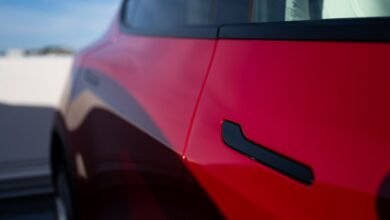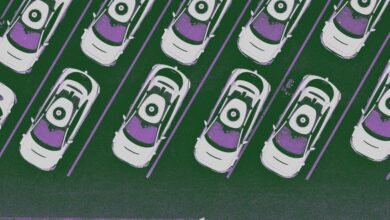Tesla’s Door Handle Redesign: Why It’s a Major Challenge

▼ Summary
– Tesla’s retractable electronic door handles have been widely imitated and represent the company’s design-first approach to electric vehicles.
– The NHTSA is investigating 2021 Tesla Model Y door handles due to over 140 consumer complaints about malfunctions and safety issues.
– Complaints include reports of children being trapped inside vehicles and at least four instances where windows had to be broken to regain entry.
– New Chinese regulations would require mechanical release handles on all cars, potentially influencing global automotive standards by 2027.
– Implementing these changes presents significant cost and design challenges for automakers due to the complex integration of components in door assemblies.
Tesla’s sleek, retractable door handles have become an iconic feature, symbolizing the brand’s commitment to futuristic, design-led electric vehicles. Adopted by numerous other car manufacturers, these electronic components represent a significant departure from traditional mechanical handles. However, this innovative design is now facing intense scrutiny from regulators and consumers alike following a series of concerning incidents.
In September, the National Highway Traffic Safety Administration initiated a formal investigation into the door handles on the 2021 Tesla Model Y. This action came after more than 140 consumer complaints were filed with the agency. Drivers reported that the handles frequently became stuck or failed to operate, particularly when a vehicle’s low-voltage battery lost power. Official government documents include alarming accounts from parents who stated their children were trapped inside their cars because the rear-door mechanical releases were impossible to locate or activate. The agency noted that at least four individuals claimed they had to “break a window to regain entry into the vehicle.” In response to these reports, Tesla has committed to a comprehensive redesign of the problematic handles.
The issue took a tragic turn recently when the families of two California teenagers filed a lawsuit against the automaker. The teenagers died after the Cybertruck they were in crashed and caught fire. The lawsuit alleges that Tesla was aware of the difficulties associated with manually opening its doors before the incident, which left the occupants trapped.
This challenge is set to become a global concern due to new regulations proposed in China, the world’s largest automotive market. The rules, which often influence standards elsewhere, could soon be adopted in other regions. The proposed regulations from China’s Ministry of Industry and Information Technology would mandate that all vehicles be equipped with mechanical release handles on both the interior and exterior. These handles must be operable without any tools following an accident. The regulations also appear to prohibit fully flush door handles by requiring manufacturers to design them with sufficient space behind the handle for a person to get a firm grip.
If these rules are finalized as expected, they are scheduled to take effect as early as mid-2027. For global automakers, this deadline is rapidly approaching given the lengthy, multi-year cycles required for vehicle design and development.
Implementing these door handle changes swiftly presents a significant and costly engineering challenge. The complexity and expense depend entirely on each manufacturer’s existing door architecture. Amy Broglin-Peterson, a supply chain management expert at Michigan State University’s Broad College of Business who consults within the automotive industry, explains the core of the problem. “There’s a real-estate problem in the door space,” she states. Modern car doors are densely packed with electronics, insulation, wiring harnesses, speakers, and numerous other components. She emphasizes that “Any time you have design changes, that messes up other things,” highlighting the intricate and interconnected nature of vehicle door systems.
(Source: Wired)





